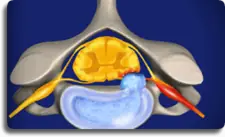Cervical Disc Herniation
Cervical-DiscThe neck, or cervical spine is made up of 7 bones, or vertebrae. These bones are separated from each other by a specialized cartilage cushion called an intervertebral disc. As we age, the tough outer ring of the discs can become weaker allowing the soft jelly like center to “squirt out”, or herniate. Herniated discs can put pressure on the spinal cord or nerve roots that pass close by. Herniated discs are also referred to as slipped discs, ruptured discs, protruding discs, or bulging discs.
In the cervical spine, a herniated disk can irritate the spinal cord or nearby nerve roots and result in neck, arm, or shoulder pain, numbness, or weakness in the arm or hand. Occasionally, large disc herniations can even cause some strange symptoms like problems with balance, difficulty controlling one’s bowels or bladder, and changes in dexterity of the hand (this can cause changes in handwriting, problems buttoning one’s shirt, or difficutly finding one’s keys in a pocket or purse.
Treatment
Fortunately, most people with herniated discs experience no symptoms whatsoever. When people do have symptoms, the vast majority of their symptoms will improve with time, and do not require surgery. However, despite adequate time, rest, and treatment, some people have pain or symptoms that persist. When this occurs, more aggressive treatment is usually sought and may include medication, epidural spinal injections, and in some cases, surgery. If surgery is required, the vast majority of herniated discs can be treated with minimally invasive surgery.
The physicians and surgeons at Florida Spine Specialists are experts in treating herniated discs in the neck. We believe in a conservative approach, utilizing all the tools and treatments currently available to help resolve our patients’ symptoms. Our priority is providing the best care for our patients, and treatment plans are tailored to each individual’s specific problems and needs.



